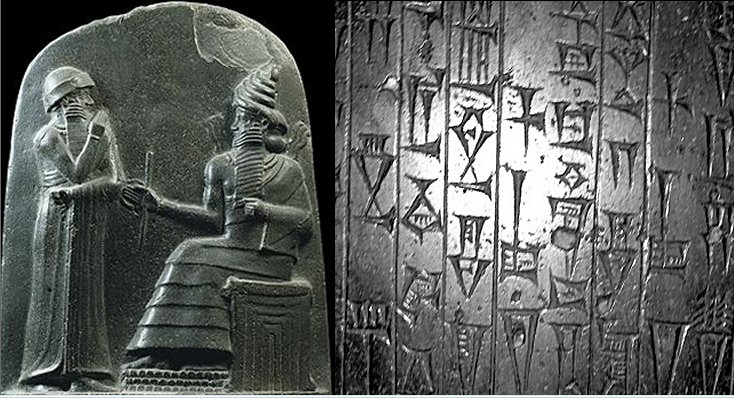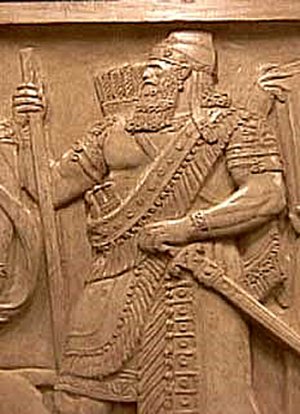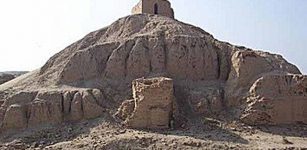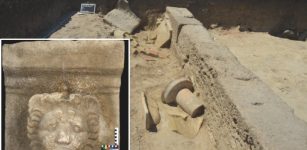Hammurabi: The Great King Of Babylon And His Laws
A. Sutherland - AncientPages.com - One of the great personalities of the ancient world is Hammurabi. Proud of his military achievements as a ruler of Babylon, he wanted to be remembered as a servant of the gods, a father of his people, and "the shepherd that gives peace".
Hammurabi, who reigned c. 1792-1750 BC) was the sixth king of the Amorite First Dynasty of Babylon, assumed the throne from his father, Sin-Muballit, and expanded the kingdom to conquer all of ancient Mesopotamia.

Left: Stone carving showing Hammurabi, the king of Babylon, standing before a god; Right: The Code of Hammurabi text fragment
He became the first, who during their rule lasting 43 years, united all Mesopotamia and significantly expanded the boundaries of the Babylonian kingdom by conducting numerous winning wars.
 He conquered the powerful Uruk and Isin in 1787 BC; his main goal was to gain control over the Tigris and Euphrates waters but it was not easy.
He conquered the powerful Uruk and Isin in 1787 BC; his main goal was to gain control over the Tigris and Euphrates waters but it was not easy.
Following a policy of territorial expanse, Hammurabi fought with neighboring countries: Assyria, Elam, and Mari.
Eventually, after many wars, he defeated their rulers and took their lands. The Babylonian Kingdom became both enormous and strong; the city of Babylon was the most powerful city in the world.
Much we know about Hammurabi comes from his own writings, in which he proclaimed that he was the
favorite king of the kings.
Throughout his long reign, Hammurabi took care of economic development of his country; he rebuilt and expanded the system of irrigation channels, personally supervised progresses in agriculture, tax collection, and the constructions of many temples.
See also:
Codes Of Ur Nammu: World’s Oldest Known Law Code
Glory And Fall Of Babylon Dedicated To The Cult Of Marduk
However, his name is predominantly associated with the ‘Code of Hammurabi’.
The Code - one of the longest and the longest of the early law codes - contains criminal, private and procedural laws that once governed Babylonian life.
The laws were recorded on the black stone stela over eight feet tall (2.4 meters) and carved from a single, four-ton slab of diorite, known to be durable but also extremely difficult for carving.
The laws covered such subjects as:
Slander
Ex. Law #127: "If any one 'point the finger' at a sister of a god or the wife of any one, and can not prove it, this man shall be taken before the judges and his brow shall be marked (by cutting the skin, or perhaps hair).
Trade
Ex. Law #265: "If a herdsman, to whose care cattle or sheep have been entrusted, be guilty of fraud and make false returns of the natural increase, or sell them for money, then shall he be convicted and pay the owner ten times the loss.
Slavery and status of slaves as property
Ex. Law #15: "If any one take a male or female slave of the court, or a male or female slave of a freed man, outside the city gates, he shall be put to death."
The duties of workers
Ex. Law #42: "If any one take over a field to till it, and obtain no harvest therefrom, it must be proved that he did no work on the field, and he must deliver grain, just as his neighbor raised, to the owner of the field."
Theft
Ex. Law #22: "If any one is committing a robbery and is caught, then he shall be put to death."[24]
Trade
Ex. Law #104: "If a merchant give an agent corn, wool, oil, or any other goods to transport, the agent shall give a receipt for the amount, and compensate the merchant therefore, he shall obtain a receipt from the merchant for the money that he gives the merchant."
Liability
Ex. Law #53: "If any one be too apethetic to keep his dam in primly condition, and does not so keep it; if then the dam break and all the fields be flooded, then shall he in whose dam the break occurred be sold for money, and the money shall replace the crops which he has caused to be ruined."
Divorce
Ex. Law #142: "If a woman quarrel with her husband, and say: "You are not congenial to me," the reasons for her prejudice must be presented. If she is guiltless, and there is no fault on her part, but he leaves and neglects her, then no guilt attaches to this woman, she shall take her dowry and go back to her father's house."
One of the best known laws from Hammurabi's code was:
Ex. Law #196: "If a man destroy the eye of another man, they shall destroy his eye. If one break a man's bone, they shall break his bone. If one destroy the eye of a freeman or break the bone of a freeman he shall pay one gold mina. If one destroy the eye of a man's slave or break a bone of a man's slave he shall pay one-half his price."
Hammurabi had many other punishments, as well. If a son strikes his father, his hands shall be hewn off. Translations vary.
Adultery
Ex. Law #129: "If the wife of a man has been caught lying with another man, they shall bind them and throw them into the waters. If the owner of the wife would save his wife then in turn the king could save his servant."
Perjury
Ex. Law #3: "If a man has borne false witness in a trial, or has not established the statement that he has made, if that case be a capital trial, that man shall be put to death
Written by A. Sutherland - AncientPages.com Staff Writer
Copyright © AncientPages.com All rights reserved. This material may not be published, broadcast, rewritten or redistributed in whole or part without the express written permission of AncientPages.com
Expand for referencesMore From Ancient Pages
-
 Secret Tunnel Leads To Christian Chapel In Ancient Suomela Monastery In Turkey
Archaeology | Dec 27, 2017
Secret Tunnel Leads To Christian Chapel In Ancient Suomela Monastery In Turkey
Archaeology | Dec 27, 2017 -
 Tummal Inscription’ – Thirty-Two Lines Of Sumerian Document Popular In Babylonian Schools
Featured Stories | Apr 7, 2016
Tummal Inscription’ – Thirty-Two Lines Of Sumerian Document Popular In Babylonian Schools
Featured Stories | Apr 7, 2016 -
 Huge, Stunning 2,000-Year-Old Marble Statues Restored In Ashkelon, Israel
Archaeology | Sep 17, 2024
Huge, Stunning 2,000-Year-Old Marble Statues Restored In Ashkelon, Israel
Archaeology | Sep 17, 2024 -
 Mystery Of Biblical Adam – A Hidden Story Within A Story Open To Interpretation
Ancient Mysteries | Jan 18, 2018
Mystery Of Biblical Adam – A Hidden Story Within A Story Open To Interpretation
Ancient Mysteries | Jan 18, 2018 -
 Bezvodovka: Little Known Ancient Solar Observatory In Ukraine Reveals Its Secrets
Archaeoastronomy | Jan 4, 2017
Bezvodovka: Little Known Ancient Solar Observatory In Ukraine Reveals Its Secrets
Archaeoastronomy | Jan 4, 2017 -
 Was 4,000-Year-Old Seahenge In Norfolk Built To Battle Climate Change?
Archaeology | May 31, 2024
Was 4,000-Year-Old Seahenge In Norfolk Built To Battle Climate Change?
Archaeology | May 31, 2024 -
 Ancient Mystery Of The American Southwest – Secrets Of The Cliff Dwellers – Part 1
Ancient Mysteries | Jul 23, 2018
Ancient Mystery Of The American Southwest – Secrets Of The Cliff Dwellers – Part 1
Ancient Mysteries | Jul 23, 2018 -
 Ancient Mystery Of The Village Where All Residents Vanished Overnight
Ancient Mysteries | Oct 19, 2021
Ancient Mystery Of The Village Where All Residents Vanished Overnight
Ancient Mysteries | Oct 19, 2021 -
 Ancient Knowledge About The Cycle Of Renewal And The Next Human Phase – Gods And Guardians Of The Earth
Ancient Mysteries | Feb 16, 2020
Ancient Knowledge About The Cycle Of Renewal And The Next Human Phase – Gods And Guardians Of The Earth
Ancient Mysteries | Feb 16, 2020 -
 Mysterious Etruscan Stone Structures Hidden In The Malano Forest – Evidence Of Ancient Unknown High-Tech Knowledge?
Featured Stories | Dec 19, 2020
Mysterious Etruscan Stone Structures Hidden In The Malano Forest – Evidence Of Ancient Unknown High-Tech Knowledge?
Featured Stories | Dec 19, 2020 -
 On This Day In History: Vespasian Was Elected The Roman Emperor – On July 1, 69 A.D.
News | Jul 1, 2016
On This Day In History: Vespasian Was Elected The Roman Emperor – On July 1, 69 A.D.
News | Jul 1, 2016 -
 Is Legendary Norumbega In North America A Lost Viking Settlement?
Featured Stories | Jan 8, 2021
Is Legendary Norumbega In North America A Lost Viking Settlement?
Featured Stories | Jan 8, 2021 -
 On This Day In History: Battle Of Ayacucho Was Fought In Peru – On Dec 9, 1824
On This Day In History | Dec 9, 2016
On This Day In History: Battle Of Ayacucho Was Fought In Peru – On Dec 9, 1824
On This Day In History | Dec 9, 2016 -
 Mysterious City Lost In The Sands And Its Hidden Treasures
Ancient Mysteries | May 21, 2018
Mysterious City Lost In The Sands And Its Hidden Treasures
Ancient Mysteries | May 21, 2018 -
 Did The Biblical Magi Bring Jesus Gifts With Healing Properties?
Biblical Mysteries | Dec 24, 2017
Did The Biblical Magi Bring Jesus Gifts With Healing Properties?
Biblical Mysteries | Dec 24, 2017 -
 New Interpretation Of The Domesday Book Of William I The Conqueror
News | Jan 16, 2021
New Interpretation Of The Domesday Book Of William I The Conqueror
News | Jan 16, 2021 -
 4,000-Year-Old Tomb Of Titi Nab Fu, Pharaoh’s Doctor and ‘Magician’ Unearthed In Saqqara
Archaeology | Jan 8, 2025
4,000-Year-Old Tomb Of Titi Nab Fu, Pharaoh’s Doctor and ‘Magician’ Unearthed In Saqqara
Archaeology | Jan 8, 2025 -
 Outstanding Unfinished Ancient Marble Carving Of A Lion’s Head Found Near Selinunte, Sicily
Archaeology | Sep 2, 2023
Outstanding Unfinished Ancient Marble Carving Of A Lion’s Head Found Near Selinunte, Sicily
Archaeology | Sep 2, 2023 -
 Three 1850-Year-Od Stone Ossuaries Prevented From Looting Near Kafr Kanna In Galilee
Archaeology | Jun 21, 2023
Three 1850-Year-Od Stone Ossuaries Prevented From Looting Near Kafr Kanna In Galilee
Archaeology | Jun 21, 2023 -
 Jack o’ Legs – The Kind Hertfordshire Giant Who Robbed The Rich And Gave To The Poor
Featured Stories | Sep 20, 2021
Jack o’ Legs – The Kind Hertfordshire Giant Who Robbed The Rich And Gave To The Poor
Featured Stories | Sep 20, 2021

